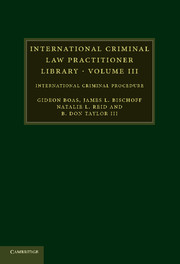Book contents
- Frontmatter
- Contents
- Foreword
- Table of authorities
- Table of short forms
- 1 The nature of international criminal procedure
- 2 Creation and amendment of rules of international criminal procedure
- 3 Procedures related to primacy and complementarity
- 4 Investigations, rights of suspects, and detention
- 5 Defence counsel, amici curiae, and the different forms of representation of accused
- 6 Pre-trial proceedings
- 7 Trial proceedings
- 8 The role and status of victims in international criminal procedure
- 9 Evidence
- 10 Judgement and sentencing
- 11 Appeal and revision
- 12 Conclusion
- Index
- References
12 - Conclusion
Published online by Cambridge University Press: 05 August 2011
- Frontmatter
- Contents
- Foreword
- Table of authorities
- Table of short forms
- 1 The nature of international criminal procedure
- 2 Creation and amendment of rules of international criminal procedure
- 3 Procedures related to primacy and complementarity
- 4 Investigations, rights of suspects, and detention
- 5 Defence counsel, amici curiae, and the different forms of representation of accused
- 6 Pre-trial proceedings
- 7 Trial proceedings
- 8 The role and status of victims in international criminal procedure
- 9 Evidence
- 10 Judgement and sentencing
- 11 Appeal and revision
- 12 Conclusion
- Index
- References
Summary
This volume examines the tangible body of rules and practices applied in the international criminal tribunals during the various steps of an international criminal prosecution: investigation; arrest; detention; charging; disclosure and other pre-trial preparation; guilty pleas; trial; appeal and other post-conviction relief; punishment; and imprisonment. It also reviews other procedures essential to conducting effective investigations and fair and expeditious trials, including rules and practices on admissibility of cases, evidence, and case management; and rules relating to the issuing of orders to states and private individuals; to the assignment of defence counsel and self-representation; the election, appointment, and recusal of judges; victim participation; and reparations.
In considering this vast array of issues, we have endeavoured, first and foremost, to explain the rules of procedure and give examples of how they function in practice. At the same time, we have sought to grapple with some of the more fundamental themes that are intertwined in the legal framework of international criminal procedure, including the ways in which international criminal tribunals and their creators constructed this area of law; how they have shaped its evolution to meet new challenges and changing circumstances; whether this effort has been successful; and whether it has adversely affected other important interests. Many of the rules of international criminal procedure seek a balance between two interests that are frequently in opposition. The international community, and especially victims, demand swift and effective justice for those who are responsible for mass atrocities.
- Type
- Chapter
- Information
- International Criminal Law Practitioner LibraryInternational Criminal Procedure, pp. 462 - 474Publisher: Cambridge University PressPrint publication year: 2011

